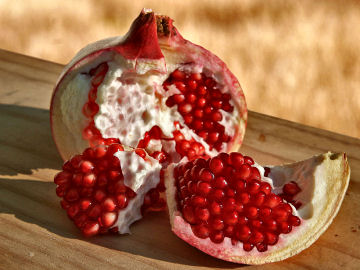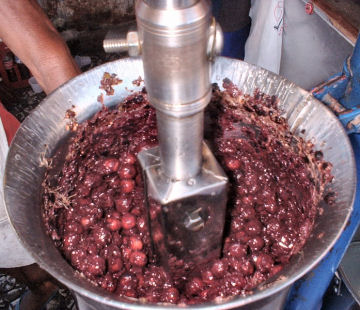How super are superfruits?
Fruits are good for you, but some advertisements claim that certain fruits are especially nutritious. Is there science to support the superfruit hype?
By Emily Sohn
You’ve probably been told a million times to eat your fruits and vegetables. If you live in the United States, that recommendation probably makes you think of apples, bananas, carrots, and broccoli. It can be boring to eat the same produce day after day. Fortunately, grocery store aisles have grown a lot more exciting lately.
Shoppers can now buy fruits and fruit juices filled with the flavors of rainforests, distant mountainsides, and tropical islands. With names like açaí (pronounced ah-SIGH-ee), mangosteen, pomegranate, noni, and goji berries, exotic fruits are showing up in growing numbers. Many of these fruits are also used as ingredients in a variety of food products, from granola to ice creams to smoothies.
In the United States, it is illegal for companies that sell products made from these fruits to make health claims about them. But that doesn’t stop magazine articles and health food proponents from doing so. And many now claim that the fruits in some of these products will fight cancer, cure heart disease, strengthen the immune system, and help people live longer, among other benefits.
Based on such claims, these natural products have been dubbed “superfruits.”
 |
|
Pomegranates, along with other exotic superfruits, are thought to be exceptionally nutritious.
|
| Fir0002/Wikipedia |
In 2007, Americans spent tens of millions of dollars on dietary supplements and foods containing superfruits, according to SPINS, a natural-products market-research firm. From 2006 to 2007, sales of goji berries, for instance, skyrocketed 75 percent. Sales of pomegranate products rose by more than 60 percent. And products containing açaí rose 50 percent.
But are mangosteens and goji berries really better for you than apples and oranges?
Companies that add superfruits to their products are funding studies that aim to establish how healthful they are. But many independent nutritionists are skeptical that these foods have extra nutritional value. The only thing that’s really special about superfruits, they argue, may be their price. Owing to the long distances they must travel to reach U.S. kitchens, these exotic fruits usually cost considerably more than local produce.
Right now, “there’s no science that these [exotic superfruits] are associated with better health,” says David Katz, director of the Yale-Griffin Prevention Research Center in New Haven, Conn. “It doesn’t mean [the companies] are wrong. The fact is, there’s no proof that they’re right.”
Superfruits are not the first foods to earn a “super” label. The term has also been used to describe a variety of more ordinary foods, including blueberries, dark chocolate, spinach, and certain types of tea.
Superfood is not a scientific term. But foods that have gained the “super” prefix tend to contain a high concentration of substances called antioxidants (see sidebar: “What Are Antioxidants?”). These chemical compounds may protect people from diseases and aging by limiting certain chemical reactions that happen naturally. But if those chemical reactions become excessive, they can cause damage to the body.
Scientists now think that eating a wide variety of plant-derived foods can make us healthier and less likely to develop certain diseases by boosting the body’s natural antioxidant defenses.
“There are lots and lots of studies that show that antioxidants do contribute to health,” says Jeffrey Blumberg, director of the U.S. Department of Agriculture (USDA) Antioxidants Research Laboratory at Tufts University in Boston.
To lure health-conscious consumers, advertisers often claim that superfruit-filled foods contain extra high levels of antioxidants. One way to measure antioxidant content is to grind up a food and put it in a test tube with free radicals. The more free radicals disabled, the scientists assume, the more plentiful and powerful the antioxidants.
Using such tests, a company called POM Wonderful found that its 100 percent pomegranate juice contained more antioxidants, per ounce, than did any of a dozen beverages made from other fruits, including blueberry, grape, and açaí. The next nearest competitor, red wine, had 17 percent less antioxidant activity than pomegranate juice did.
The Web site for Sambazon, a company that makes products containing açaí, says that this fruit has 30 times as many antioxidants as an equivalent quantity of red wine and 50 percent more antioxidants than an equal amount of pomegranate.
Claims such as these are confusing and conflicting because tests that measure antioxidant levels are unreliable, Blumberg says. Results depend on which parts of the fruit scientists grind up, for one thing. In fact, related tests sometimes produce opposite results. And when different labs do the same test they will sometimes come up with different numbers.
 |
|
Nutritionists recommend eating a wide variety of fruits and vegetables.
|
| iStockphoto |
Another problem is that what happens in a test tube is so simple that it might not predict what will happen in more complex environments, such as the human body. Indeed, certain phytochemicals might never even get into our bloodstream after we eat them, notes Will McClatchey, a botanist at the University of Hawaii, Manoa.
“Some [antioxidants] might be beneficial for us,” McClatchey says. “Some might not. Just because something tests out in a lab to be an antioxidant doesn’t mean it will continue to be an antioxidant when it passes through the digestive tract.”
Health claims
Partly in response to criticisms like these, superfruit scientists are now doing studies in both animals and in people. One goal is to prove that eating these fruits contributes to better health.
Some industry studies have yielded encouraging results. POM Wonderful, which has spent $23 million on pomegranate research over the past decade, has evidence that a daily cup of the company’s pomegranate juice raises antioxidant levels in the bloodstream. Its studies also suggest that drinking the juice protects against heart disease and certain types of cancer.
Similarly, studies funded by a company called Tahitian Noni International have found that drinking noni juice reduces concentrations of certain free radicals in the blood. Early evidence also suggests that the juice might help athletes run longer distances without getting as tired as they normally do, says Brett West, who directs research for the company.
 |
|
Açaí berries, which grow in Brazil, must be ground up in order to extract the juice.
|
| Decio Horita Yokota/Wikipedia |
Studies like these add to a long history of medicinal uses for natural products in traditional cultures. The açaí fruit, for one, which grows only on palm trees in the Brazilian Amazon, has been used to treat fevers. Goji berries, which grow in China and Tibet, have been used to reduce inflammation and improve eyesight. And pomegranates, which are native to Iran and India (but now also grow in California), are sometimes eaten to relieve digestive distress.
Still, there are no large, long-term studies that clearly link any exotic fruits with better health. And nutritionists worry that people are too easily drawn in by whatever’s new and different. All the studies that do show health benefits of certain fruits were sponsored by companies that sell them, and most of the studies lasted only a few days or months.
“It is much easier to ascribe a magical or health property to goji or açaí or chasteberry than to an apple or orange because we already know about apples and oranges,” Blumberg says. But apples, oranges, and other ordinary fruits also contain plenty of vitamins, minerals, and antioxidants.
It can’t hurt to add superfruits to your diet, adds David Grotto, a Chicago-based dietician and author. He regularly makes açaí smoothies and rice pudding with goji berries, among other exotic menu items, for his three daughters, ages 13, 10, and 9.
(Grotto’s kids like these foods, but it may take a few tries to develop a taste for exotic fruits. Pomegranates are tart. Goji berries resemble stale raisins. And açaí can taste like cheese).
If you can’t stomach them, can’t find them, or don’t want to spend the extra money on them, don’t worry. Eating a wide variety of colorful fruits and vegetables is far more important than eating any one thing.
“Variety is the spice of life,” Grotto says. And, he adds, sampling exotic foods can be an adventure. So, make sure to enjoy the journey!
Going Deeper:







